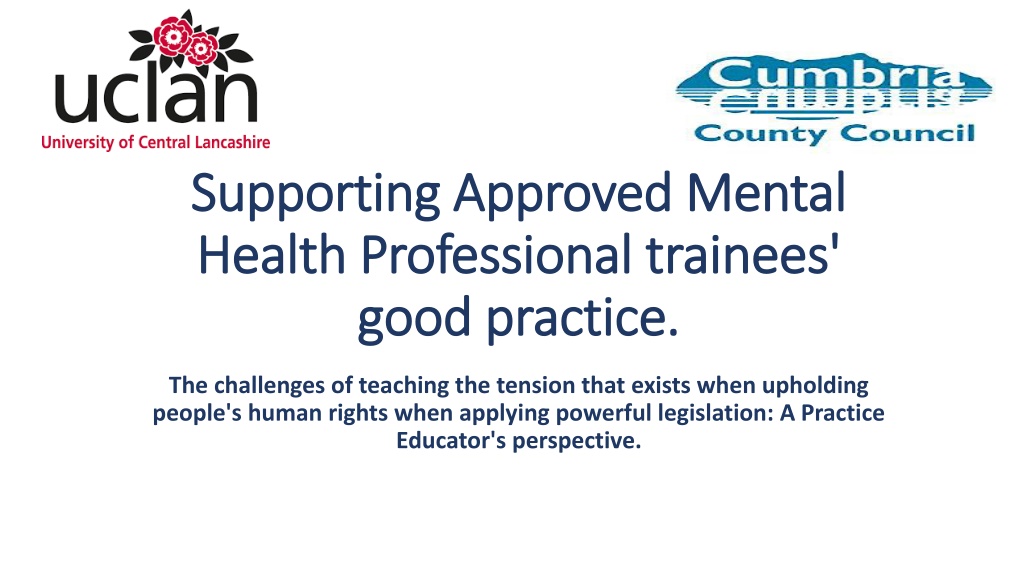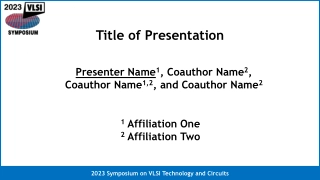Exploring Challenges and Best Practices in Teaching Approved Mental Health Professional Trainees
Collaborating between Cumbria County Council and the University of Central Lancashire, this initiative delves into the complexities faced by Approved Mental Health Professionals in upholding human rights while implementing powerful legislation. With a focus on AMHP practice education, this project aims to address unique tensions and autonomy issues through specialized training and research, involving social workers and AMHP trainees on placement.
Download Presentation

Please find below an Image/Link to download the presentation.
The content on the website is provided AS IS for your information and personal use only. It may not be sold, licensed, or shared on other websites without obtaining consent from the author. Download presentation by click this link. If you encounter any issues during the download, it is possible that the publisher has removed the file from their server.
E N D
Presentation Transcript
Supporting Approved Mental Supporting Approved Mental Health Professional trainees' Health Professional trainees' good practice. good practice. The challenges of teaching the tension that exists when upholding people's human rights when applying powerful legislation: A Practice Educator's perspective.
Who we are and what we do Matt Graham Senior Lecturer, University of Central Lancashire Jonathan Ashworth Mental Health Team Manager, Social Worker, and Approved Mental Health Professional (AMHP), Cumbria County Council Lesley Farragher Mental Health Social Worker and AMHP, Cumbria County Council Che McGarvey-Gill Mental Health Social Worker and AMHP, Cumbria County Council Steve Nellist Urgent Care Team Social Worker and AMHP, Cumbria County Council Becky Squires Mental Health Professional Practice Co-ordinator, Social Worker, and AMHP, Cumbria County Council Alla Stoica Mental Health Social Worker and AMHP, Cumbria County Council
Introduction Cumbria County Council a large rural county in North West England has collaborated with the University of Central Lancashire to explore ways of teaching AMHP practice with social worker AMHP trainees on placement We have drawn on themes from social work practice education literature and research AMHP practice education also has unique qualities, tensions and autonomy that arise from the complex role of the AMHP, requiring specialist consideration for the educator and trainee
Introduction Approved Mental Health Professionals 95% of whom are Social Workers bring a social perspective to assessments under the Mental Health Act 1983 (amended 2007), for people experiencing significant mental disorder and distress In deciding whether or not to apply for a person s compulsory detention in hospital, AMHPs balance complex human rights; liberty, safety, autonomy
What we will be doing today We will present the key points and highlights from each of the 3 papers that we have produced: 1. Modelling Good AMHP Practice 2. Direct Observation of the AMHP Trainee s practice 3. Supervision: Pedagogical Perspectives Opportunity for discussion on the key issues will follow each paper
Modelling Good Practice Key Points The Practice Educator Professional Standards 1. The continuing professional development of the educator and application of knowledge to the assessment process. 2. The use of authority and power, including own prejudices and personal values. 3. Respect for the individual needs and preferences of students. 4. Anti-oppressive practice within the assessment process. (Field, et al, 2014)
Modelling Good Practice Discussion area How do AMHPs act anti-oppressively when applying a piece of legislation which is deemed by many to be highly oppressive? How are good values modelled within this complex process?
Direct Observation Key Points Democratic process Support is a democratic and reciprocal process Acknowledge the tension with supporting trainees Understanding the complex eco system of mental health Discourage atomised and decontextualized approach
Direct Observation Key Points Unearthing the tensions Acknowledge that as practice educators we are not purveyors to absolute truth The importance of safe space The importance of reflection Overwhelming experience
Direct Observation Discussion area Is there a safer way to expose trainee AMHPs to situations that are utterly unacceptable or is real experience required to support learning? Do you feel there is a better way to manage the tensions/anxieties trainee AMHPs can experience during their training?
Supervision: Pedagogy Key Points The connection between the AMHP role and social work Practitioners simultaneously carry out the following roles: Competent practitioners (applying skills in their work) Professionals (applying values) Social scientists (applying knowledge) Croisdale-Appleby (2014)
Supervision: Pedagogy Key Points Segments of competence - Stone (2016) Skills Values Knowledge Resilience Approach to Learning Emotional Intelligence
Supervision: Pedagogy Key Points Functions of supervision - Kadushin Managerial (or administrative) function Case load management/ timescales/ policy Educational function Developing knowledge/skills/ values Supportive function Psychological/ interpersonal support
Supervision: Pedagogy Key Points Why is the supportive element so important for AMHPs? Decisions made by AMHPs - impacts on human rights Reflection is usually after an event, rather than before Emotional labour Coercive support dirty work
Supervision: Pedagogy Key Points Reflective learning models
Supervision: Pedagogy Discussion area How do AMHP Practice Educators enable reflective practice? When providing supervision to AMHP trainees how do practice educators ensure that the supportive function of supervision is not overshadowed by the managerial or educational functions?
Supporting Approved Mental Supporting Approved Mental Health Professional trainees' Health Professional trainees' good practice. good practice. The challenges of teaching the tension that exists when upholding people's human rights when applying powerful legislation: A Practice Educator's perspective. Any further comments? Thank you for listening and for your presence today.























